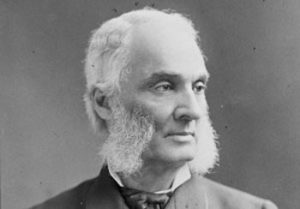
Robert Purvis
*Robert Purvis was born on this date in 1810. He was a Black political leader and abolitionist.
From Charleston, South Carolina, the second of three sons born to a white cotton merchant and a free woman of color. His maternal grandparents were a former slave and a white Jewish-American from Charleston. His mother, Harriet Judah, was a free woman of color, and Purvis's father was an English immigrant. His maternal grandmother, Dido Badaraka, was kidnapped at age 12 from Morocco, transported to South Carolina on a slave ship, and sold as a slave in Charleston. He described her as a full-blooded Moor, dark-skinned with tightly curled hair. She was freed at age 19 by her master's will.
Harriet's father was Baron Judah, born in Charleston of white-European Jewish descent. Baron was the third of ten children born to Hillel Judah, a German-Jewish immigrant, and Charleston native Abigail Seixas, his Sephardic Jewish wife. Young Purvis was to be a determined opponent of slavery. At nine, his father sent the family to Philadelphia, where Purvis enrolled in the Pennsylvania Abolition Society’s Clarkson School. He later attended Amherst College in Massachusetts.
His father’s death left the family well off financially, and with shrewd business savvy, Purvis put his commerce sense to good use. Light-skinned and wealthy, he rejected suggestions that he relocate and “pass.” In 1831, he married Harriet Forten, the daughter of Black businessman and abolitionist James Forten. Throwing himself into the antislavery struggle, he tirelessly worked with the Philadelphia Vigilance Committee. They sheltered runaway slaves in Purvis’ “Safe House.”
He was an active member of William Lloyd Garrison and the American Anti-slavery Society in 1833. He traveled to Europe, meeting with British officials, to stop slavery. For two decades, Purvis lived in an elegant home in Philadelphia where he entertained abolitionists globally, working politically to end slavery. It was here, through his efforts with his father-in-law, that his niece Charlotte Forten (educator) 's career was influenced. He welcomed the American Civil War, urging President Lincoln to make emancipation his goal. Purvis was asked to head the Freedmen’s Bureau at the war's end.
Fearing President Andrew Johnson was attempting to destroy the bureau, he refused to keep Black support, accurately sensing a ploy by the President. Initially a Republican, Purvis became disheartened as the party retreated from the principles it advocated during reconstruction. In the mid-1870s, he was criticized for his position on the Fifteenth Amendment, which was ratified in 1870. A lifelong supporter of women’s rights, Purvis argued that Black men should not be enfranchised unless women received the vote. In the last two decades, he became an elder statesman, tending to his possessions at home. Robert Purvis died in April 1898 in Philadelphia.
The Encyclopedia of African American Heritage
by Susan Altman
Copyright 1997, Facts on File, Inc. New York
ISBN 0-8160-3289-0